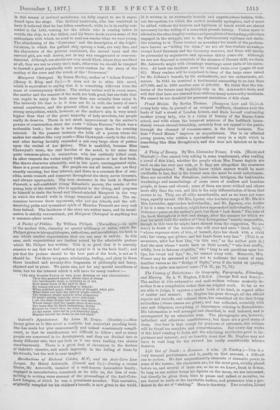A Thing of Beauty. By Mrs. Alexander Fraser. 8 vols.
(Hurst and Blacket+.)—One cannot help asking in some wonderment, after reading a novel of this kind, whether the people whom Mrs. Fraser depicts are such as she has ever mot with, or if they are altogether the creatures, of her imagination ? We hardly know which answer would be most creditable to her, but in the former case she must be most unfortunate. Hero are recorded the flirtations, jealousies, intrigues, the fashionable wanderings and maunderings of some score of soulless and boneless, people, at home and abroad; some of them are more wicked and others more silly than the rest, and this is the only differentiation of them that occurs to us. They are all alike unendurable, and as we have yet some hope, equally unreal. Old Mrs. Lyster, who is a faint image of Mr. Black's Mrs. Lavender, approaches individuality ; and Mr. Egerton, who doubte if he is a man or a monkey, might have approached individuality, with a little more pains on the author's part, but these "lack finish." The tone of the book throughout is fast and slangy, after the manner for which we- fear we must hold the author of " Guy Livingstone" mainly responsible, though in this case he might have shrunk from the suggestion. We are weary to death of the heroine who will ever and anon " blush hotly," "whose supremo scorn of him, of herself, dyes her cheek with a vivid, red ; her tawny eyes glitter, and her heart beats very fast." (This is at seventeen, after her first kiss, "in this way," as the author puts it.) And the men whose "words burn on their mouth," "who love madly, wildly, love to fatuous stupidity," who "long to ask questions upon her lips, her sweet red lips," ch., we cannot away with. Moreover, Mrs. Fraser may be entreated at least not to maltreat the metre of Buell familiar verses as the "Bridge of Sighs," even if she insist on quoting them in a quite non-natural sense (Vol. II., pp. 71, 72).






































 Previous page
Previous page